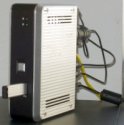Big Blue boasts of “fastest chip ever”
May 21, 2007IBM claims to have doubled the performance (or halved the power requirements, depending on your point of view) of its top-end processor for servers and mid-range systems. The dual-core “Power6” processor clocks to 4.7GHz, has 8MB of L2 cache, and breaks four widely used Unix performance benchmarks, according to the company. (more…)
 A university spin-off company in Spain is readying an inexpensive Zigbee-based “mote” sensor built entirely with open-source hardware and software. Libelium's 120-Euro SquidBee will ship this summer, optionally with a Debian-based WiFi access point that can bridge Zigbee and WiFi mesh networks.
A university spin-off company in Spain is readying an inexpensive Zigbee-based “mote” sensor built entirely with open-source hardware and software. Libelium's 120-Euro SquidBee will ship this summer, optionally with a Debian-based WiFi access point that can bridge Zigbee and WiFi mesh networks.  Freescale is readying a new high-end model in its “MobileGT” family of Linux-friendly telematics SoCs (system-on-chip processors). The MPC5121e is built on 90nm CMOS technology for low power consumption, and integrates a 400MHz PowerPC, 2D/3D graphics core, and programmable media-processing core optimized for real-time…
Freescale is readying a new high-end model in its “MobileGT” family of Linux-friendly telematics SoCs (system-on-chip processors). The MPC5121e is built on 90nm CMOS technology for low power consumption, and integrates a 400MHz PowerPC, 2D/3D graphics core, and programmable media-processing core optimized for real-time…  Acme Systems has introduced a tiny Linux-based gateway that connects cellular SMS (simple message service) and TCP/IP networks. The SMS FoxBox integrates a quad-band GSM modem, offers web, email (smtp/pop3), and mysql interfaces, and supports local message storage through removable flash storage.
Acme Systems has introduced a tiny Linux-based gateway that connects cellular SMS (simple message service) and TCP/IP networks. The SMS FoxBox integrates a quad-band GSM modem, offers web, email (smtp/pop3), and mysql interfaces, and supports local message storage through removable flash storage.  Using thin clients instead of conventional PCs would lower energy consumption by 51 percent and reduce CO2 emissions, concludes a recent study by the Fraunhofer Institute. The study, whose results were announced today by Igel Technology, compared thin clients manufactured by Igel to conventional business PCs.
Using thin clients instead of conventional PCs would lower energy consumption by 51 percent and reduce CO2 emissions, concludes a recent study by the Fraunhofer Institute. The study, whose results were announced today by Igel Technology, compared thin clients manufactured by Igel to conventional business PCs.  Mizi Research has updated its graphical user interface framework for consumer electronic devices like mobile phones. Prizm 3.0 has switched to Python as its main application programming language, and has gained modern visual effects such as “dragging, sliding, fading and accelerated smart scrolling,”…
Mizi Research has updated its graphical user interface framework for consumer electronic devices like mobile phones. Prizm 3.0 has switched to Python as its main application programming language, and has gained modern visual effects such as “dragging, sliding, fading and accelerated smart scrolling,”…  Actiontec Electronics has released its next-generation powerline networking kit based on the HomePlug AV standard for distributing large multimedia and data files around the home without Ethernet cabling.
Actiontec Electronics has released its next-generation powerline networking kit based on the HomePlug AV standard for distributing large multimedia and data files around the home without Ethernet cabling.  The Damn Small Linux (DSL) project has introduced a tiny PC based on a custom passively cooled nano-ITX board. The “Damn Small Machine” (DSM) is powered by an 800MHz Via Eden processor, and could well be the first complete, off-the-shelf nano-ITX based system.
The Damn Small Linux (DSL) project has introduced a tiny PC based on a custom passively cooled nano-ITX board. The “Damn Small Machine” (DSM) is powered by an 800MHz Via Eden processor, and could well be the first complete, off-the-shelf nano-ITX based system.